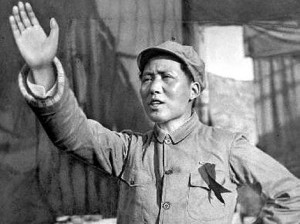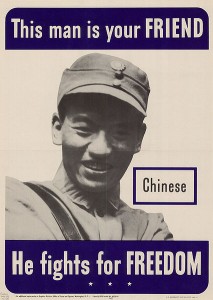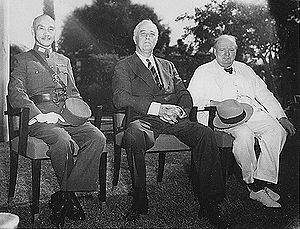History of the PRC – Part Seventeen Posted by sasha on Apr 7, 2011 in Culture
After the New Fourth Army Incident, things were not looking good for China in the Second Sino-Japanese War. The tension between the Nationalists and the Communists of China was escalating, and it became clear that the two sides could not put aside their hatred for each other to cooperate against the Japanese. It was apparent that the Chinese Civil War was destined to continue, with the Second United Front ending and intense fighting between the KMT and CCP resuming.
While Chiang Kai-shek was still firmly in control of the KMT, it was not quite clear who was leading the CCP. That would all change, though, with Mao Zedong outlying a plan to seize power from Chiang’s forces. Mao’s teachings would become central to the mission of the CCP, and his plan of taking control of the Communist forces was coming to fruition.
From the onset of the war with Japan, China had received very limited foreign aid. Most countries thought that China would lose the war, and they also did not want to start a fight with conquest hungry Japan. Despite the fact that they were already at war in China, Japanese forces attacked the United States at Pearl Harbor in December 1941. Shortly thereafter, China finally officially declared war on Japan, as well as Germany and Italy. The Japanese attack also brought the US into the war in China. From that moment on, the US would provide a great deal of aid to China to help defeat Japan. Also, the war between Japan and China became intertwined with World War II (第二次世界大战 – dì èr cì shì jiè dà zhàn). Franklin Delano Roosevelt even referred to the Big Three (US, UK, and Soviet Union) and China as being the world’s “Four Policemen.”
A few weeks after attacking the Western Allies, the Japanese were on the offensive in China yet again, with the third Battle of Changsha (长沙战役 – chǎng shā zhàn yì). Japanese forces had captured Hong Kong on Christmas Day, and they decided to advance to Changsha to do more damange to China. The Chinese were ready, though, and they won a decisive victory in Changsha, causing substantial losses for the Japanese. In addition, Chiang’s reputation across the globe improved as he was seen as being able to help defeat Japan. However, while Chiang was receiving foreign support for his efforts against Japan, Mao and the CCP were gaining popularity and support all throughout China. At this moment in time, it seemed as if the whole world was at war. In China, a civil war raged at the same time as both sides did battle with Japan, who was also at war with many other countries. Believe it or not, however, our history lesson about the foundation of the People’s Republic of China is nearing its conclusion.

Build vocabulary, practice pronunciation, and more with Transparent Language Online. Available anytime, anywhere, on any device.
About the Author: sasha
Sasha is an English teacher, writer, photographer, and videographer from the great state of Michigan. Upon graduating from Michigan State University, he moved to China and spent 5+ years living, working, studying, and traveling there. He also studied Indonesian Language & Culture in Bali for a year. He and his wife run the travel blog Grateful Gypsies, and they're currently trying the digital nomad lifestyle across Latin America.







Leave a comment: